Running brings us so much joy and strength. Personally, much of my strength as an adult came from running as a kid (thanks, Dad!). So, how do you get your kids to start running?
My daughter ran her first race when she was 4. And, no exaggeration needed, the transformation in her was remarkable. When we lined her up for the one-mile fun run, my husband and I worried how she would respond. Eleanor is incredibly aware of herself and her surroundings making her tentative in new situations. We wondered how she would respond to the large crowd of people, the loud gun going off, and if she thought she wasn’t the fastest kid. All these things were trigger points for a meltdown.

But…SHE LOVED IT. Eleanor naturally focused on doing her best—ensuring no one passed her, constantly looking over her shoulder, and then sprinting when she saw a competitor nearby (which is an adorable but also very unsteady race strategy).
Related: Age-by-Age Guide to Start Your Kids Running
How running changed my daughter
When Eleanor crossed the finish line, she became a different girl. She no longer shied away from new situations or new things. She jumped into everything full of zest and confidence!

Following that race, my husband and I entered Eleanor into several others, but it wasn’t all skittles and sunshine. One race, she fell and rolled into a ditch. Her knees and elbows were bleeding. We were a half-mile in, and she cried for her dad. She wanted to quit. I carried her for part of the way and when we saw an older girl trying to pass her, that competitive spirit kicked in and she sprinted the last 300 yards or so, leaving that girl in her fiery little dust. (Eleanor is very competitive if you can’t tell.)
Kids naturally love to run. They see us running and how much we love it. And they feel it too—the power and freedom that comes with moving your body and going fast.
I remember it as a girl—racing my dad on sidewalks and then eventually competing in races starting around 6-years-old. The experience gave me the boost to try other things and persevere when the going got tough. I truly believe my discipline and confidence as a grown woman comes from those experiences more than three decades ago!
But how do you turn that innate love into a lifelong habit?
I’ve asked the experts…namely, other mother runners who have done this successfully and Dr. Allie Riley, VP of Programming and Evaluation of Girls on the Run (GOTR). GOTR is a national nonprofit organization that offers programming to strengthen third- to eighth-grade girls’ social, emotional, physical, and behavioral skills to successfully navigate life experiences. As past president of our local GOTR chapter, I’ve seen firsthand the positive impact the program can have on girls and their families.
In this article, I will cover:
- when should you start your kids running
- how far can kids run
- when can I teach my kids to run a 5k
- 15 expert tips to motivate your kids to run
Let’s go!
What is a good age for a child to start running?
In an unofficial poll of mother runners, more than 60 percent of mother runners’ children started running at the age of 6 or younger. Starting at this age taps into that early love of running where kids discover the feeling of freedom and empowerment in moving their bodies. About 15 percent of mother runners’ children started running in elementary school, 10 percent in middle school, and 10 percent in high school. It is NEVER too late to start running.
When can I teach my child to run a mile?
Pediatricians note that between the ages of 6 and 8 is an appropriate time for kids to learn to run a mile without stopping.
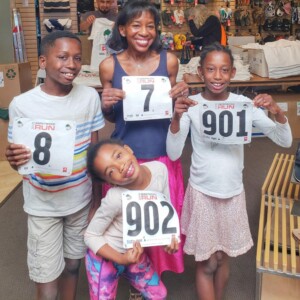
When can I teach my child to run a 5k?
Kids are ready to run longer distances such as a 5k around the ages of 8 to 10. It is important to add that a child’s individual rate of development and desire to run is what matters more than his or her actual age.
Related: How to Start Running After Baby
Why is it important to get kids, particularly girls, involved in running?
The National Physical Activity Plan 2016 assessment finds that only about 20 percent of all youth ages 6-19 meet physical activity guidelines. Girls report lower levels of physical activity than boys, with girls of color, girls living below the Federal poverty line, girls with disabilities, and those who identify as LGBTQ+ less likely to participate. Significant opportunity gaps also exist based on demographics, which are a large contributor to the gap in physical activity.
“It is important for all girls to have the opportunity to be physically active. Running requires minimal equipment and can be continued across the lifespan, which can make it an accessible activity for many,” says Dr. Riley.
Related: 12 Genius Tips for Stroller Running
What are the mental and physical health benefits of running for kids?
Some of the psychosocial health benefits of running in children include perceived competence and confidence, stress relief, anxiety management, and development of key life skills like goal setting, teamwork, and cooperation.
According to Dr. Riley, girls’ confidence begins to drop in elementary school and this decline continues throughout adolescence. Running provides a platform for girls to set and achieve goals over time. As girls make progress, their confidence grows!
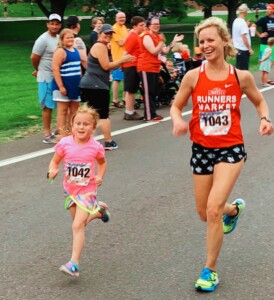
As for physical health, kids who run or participate in other physical activity regularly have stronger bones and muscles, higher levels of cardiorespiratory fitness, improved cognitive function, and are at a reduced of cancer, diabetes, and depression.
What are the impacts of running on a family?
You hear it time and again, someone catches someone else’s running habit. Dr. Riley has stories of girls encouraging others to join their program, creating a ripple effect of healthy habits and strong self-confidence. Indeed, the program’s positive impact ripples throughout families where parents start running in order to be involved with their kids’ running either as a coach, training partner, or racing partner in the celebratory 5k.“One mom’s experience with GOTR sparked a passion for running in her and she is now a regular participant in the running community in her town,’ shares Dr. Riley.
How do I motivate my child to run?
Parents have a big impact on whether or not kids become interested in running. “They provide opportunities, act as role models, and can create a climate that can either inspire girls to continue or hang up their shoes,” shares Dr. Riley.
How to get your kids to start running
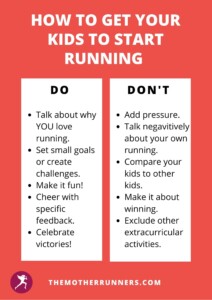
Here are 15 tips from fellow mother runners and Dr. Riley to get your kids to start running:
Self-reflect.
Before you start your kid running, think about why you want them to start running. Is your goal for their health? To have fun? Build confidence? Teach goal-setting? Grow a lifelong love of running?
Ensure your approach aligns with these goals. “While most grown-ups would probably not say their goal is developing a professional athlete, they may subconsciously take an approach that aligns more closely with this goal than the ones they are striving for,” notes. Dr. Riley
Start slow and run together.
Many mother runners started running with their kids at the end of stroller runs. I started running foot races with my kids in the yard. I would run the tail-end of marathon training runs with dad. Sprinkling in little bursts of running into your kids’ days can foster that natural interest in the sport.

Keep it fun.
Creating a strict training schedule or making running a “chore” is certain to kill any interest in the sport. Keep it casual with zero pressure. You can make games out of running that includes activities they love like jumping rope, scavenger hunts, dancing, tag, or obstacle courses. (Get other great running game ideas here.) Check-in with your kid to make sure he or she is having fun. If not, work together to figure out how you can make it more enjoyable for the both of you.
Cheer…a lot.
Tell your kids how awesome they are…and then do it again. Reassurance while running gives them the mental strength they need to keep at it. And, we all know, the more you run, the easier it feels. Make sure your feedback is specific. A general “you’re doing awesome!” is great but also including why it was so awesome (they fell and got back up again! They conquered a big hill! They kept running when they said they were tired!) reinforces their achievements and makes it more likely they’ll do it again.
Talk about your “why”.
When you talk about your own running in front of your kids, pay attention to what you’re saying. Be intentional to talk about WHY you love running and your own personal accomplishments. Just like how we watch what we say about body image and food, watch what you say about your own goals and achievements.
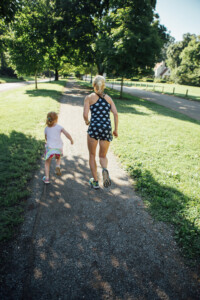
Get them involved.
Make time to run with your kids at the end of your runs. Take them to your races. Have them run warm-up and cool-downs with you. Exposing them to the sport and your training will encourage that innate desire to “be like mommy (or daddy).”
Make it about more than running.
A big part of why we love running so much is the amazing community. Share with your kids how running has introduced you to so many awesome people and helped you make so many, great friends. Show them how you support others, and they support you. It may be an individual sport but really runners are part of one giant team where we’re all rooting for one another.
Set goals together.
Just like you do for yourself, set little goals together with your kids. It can be based on time, distance, frequency, etc. At Girls on the Run, the girls train over the course of a season for a 5k, creating smaller personal (process) goals along the way. “Training for and completing this culminating event provides girls a tangible sense of accomplishment that leads to confidence,” says Dr. Riley.
Create small challenges.
Use that creativity you’ve exercised to stay motivated during the pandemic with no races on your kids. Create similar process goals or challenges like running a marathon in a year or completing a lap without stopping. Make a big deal when they accomplish their goals!
Find a group.
There are several run programs for kids like Girls on the Run, Kids Run the Nation, Morning Mile, as well as local programs. My daughter created a “run club” with some other friends where they just ran wild in a field alongside a river completely unstructured and completely fun. Running with others helped her go farther than she would have alone (sounds familiar, huh?).
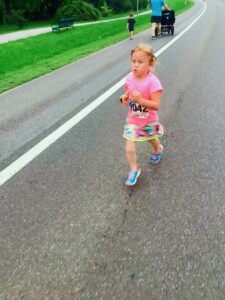
Enter fun runs.
There is possibly no better way to hook someone on running than to encounter the race experience. Enter your kids into a mile fun run with a focus on FUN such as a school Color Run. Let them take the lead on how fast or far they want to go. Resist the urge to coach them. Instead, cheer them on and tell them how amazing they are doing. This will create a positive experience so that they want to do it again.
Don’t make it exclusive.
Don’t make running “their only thing.” If your child would rather play soccer or learn chess, encourage that. Allow time for them to seek out what they truly enjoy which may or may not include running. A surefire way to douse any interest is to add pressure to it.
Don’t make it about winning.
Dr. Riley stresses, “It is absolutely essential that grown-ups create a climate that is focused on effort and personal improvement (mastery climate) instead of social comparison and winning (performance climate). When grown-ups create a mastery climate, girls experience less anxiety, are more likely to learn skills, and are more motivated to work towards their goals.”
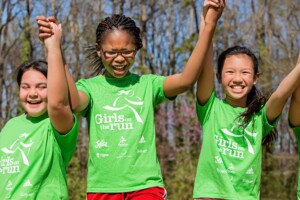
Focus on individual improvement.
Dr. Riley notes the importance of focusing on one’s own improvement and effort instead of comparing themselves to others. “If they were able to run 6 laps yesterday how many do they think they can run today?,” she shares. “We use fun lap counters to motivate girls and help them celebrate their personal improvement.” Remind your kids how far they’ve come/how they’ve improved. Ask questions like, “how did you do that?!” to enforce their hard work and accomplishments.
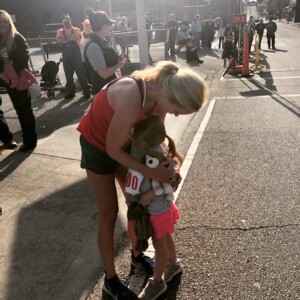
Celebrate!
Always take time to celebrate your child’s accomplishments. Throw a party, tell your friends, get a treat or a prize. Emphasize how amazing it is that they set a goal and worked hard to achieve it. This can provide the foundation for a lifetime of healthy habits and healthy self-confidence.
A special thanks to the mother runners and Dr. Riley for contributing to this article!
Girls on the Run has served more than 2.0 million girls since 1996. An independent study found that 97% of participants learned critical life skills including managing emotions, resolving conflict, helping others, or making intentional decisions at Girls on the Run that they continue to use at home, at school, and with their friends. Learn more at www.girlsontherun.org.
PS-I’d love to help you reach your running goals whether it be to run your first 5k or run competitively! Email me at [email protected] with questions or check out my Coaching Services page!

Hi,
My friend runs (haha) the 100mileclub.com, which is also a great running program for kids. Please check it out.
Thanks, Ashley! I will!